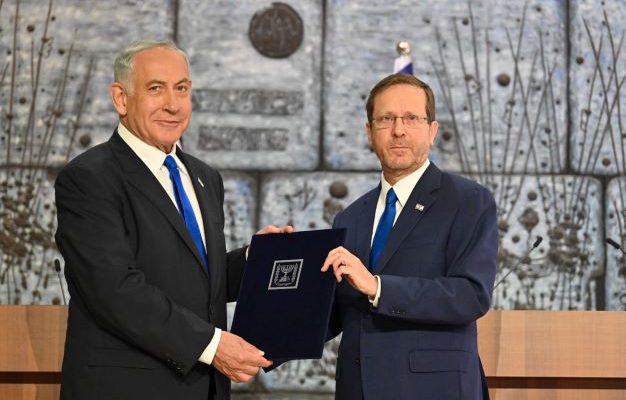Israel’s president grants Benjamin Netanyahu mandate to form new coalition government. Netanyahu now has 28 days to secure the backing of a majority of the incoming Knesset.
By World Israel News Staff
Israeli President Isaac Herzog on Sunday assigned the task of forming a new government to Likud chief Benjamin Netanyahu.
Opposition Leader Netanyahu will now need to complete coalition agreements with his right-wing allies in order to secure the support of at least 61 Knesset Members.
The right-wing bloc, including the Likud, Religious Zionist Party, Shas, and United Torah Judaism, won a total of 64 seats in this month’s Knesset election.
For coalition talks, however, the Religious Zionist Party has split up into its constituent factions, with Otzma Yehudit’s six MKs and Noam’s lone MK negotiating separately from the Religious Zionist Party.
Barring a scenario in which Netanyahu can convince lawmakers from the bloc of parties which unseated him last year to cross the aisle, the Likud chairman will require the support of every faction in the right-wing – religious bloc in order to reach a majority, with the exception of the Noam party and its single MK.
Netanyahu has 28 days to present a new coalition, though he is permitted to request a 14-day extension to complete negotiations.
While the Likud had planned to complete coalition talks this week and submit a new government to a Knesset vote shortly after the swearing in of the 25th Knesset this Tuesday, a report by Kan Reshet Bet cited an official who said delays in negotiations would likely preclude the formation of a government before next week.
Meeting with Herzog at the President’s Residence Sunday afternoon, Netanyahu said he would work to represent all Israelis, including those who did not support him in the November 1st election.
“I intend to work to broaden the zone of consensus among us, without exception.”
At the top of his agenda, Netanyahu listed confronting Iran’s nuclear aspirations, followed by expanding the Abraham Accords peace deals with moderate Arab states, pledging “further peace deals” and “peace through strength” in order to “end the Israeli-Arab conflict.”
“I did not say the Israeli-Palestinian conflict, but in my opinion this is the preliminary stage that would also bring that outcome.”
Regarding Iran, Netanyahu said Israel must “determinedly take action against Iran’s belligerence and, above all, foil its effort to arm itself with nuclear weaponry, which has direct designs against our existence.”





